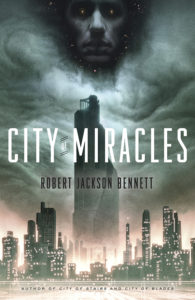“City of Miracles” by Robert Jackson Bennett
 I enjoyed the first two Divine Cities books (see my reviews of City of Stairs and City of Blades) so I was looking forward to see how City of Miracles wrapped up the story.
I enjoyed the first two Divine Cities books (see my reviews of City of Stairs and City of Blades) so I was looking forward to see how City of Miracles wrapped up the story.
This series changes protagonists in every installment, and this one is narrated by ex-spy and ex-royalty Sigrud je Harkvaldsson, who was a secondary character in both the previous books. After the events of City of Blades, Sigrud has been working menial jobs and trying to stay hidden, waiting for Shara to find him somehow and give him a new assignment. When Shara is suddenly assassinated, he gains a purpose at last – finding Shara’s killer – but following that trail tumbles him into a covert war against a angry young god.
Just like the earlier two books, this one tells a self-contained story. It also wraps up the overarching plot arc of the six original Divinities in a satisfying manner. I wasn’t even sure what the overarching plot arc was, since the books seem designed to be standalones, but it was obvious by the end of the book and a lot of things from earlier made sense in retrospect.
I didn’t find Sigrud to be a particularly compelling character in the last two books so I was dreading his point of view a little bit. I should have trusted the author, though, because Sigrud from the inside is quite different from observing him through other characters’ eyes. We get to see what goes through his head when other characters only see him being silent and emotionless, and he’s much more sympathetic than I originally gave him credit for. I was similarly skeptical about the idea of Shara being dead (especially offscreen!), but the author handled that very well, too.
One of the things I love most about these books is the world – the Divinities and the way they manifest are unique and weird and wonderful. City of Miracles expands our understanding of the world and the mechanics of how the divine powers work even more, which was great. And the setting itself is interesting – a post-colonial era where everything has recently industrialized, and new engineering projects are far more likely to be brought up than magic, even though magic is more obviously present.
I feel like my enjoyment of these books kind of snuck up on me, but now I think of the series as one of the most innovative and original fantasy I’ve read. If you haven’t read this series already, I recommend starting with City of Stairs for the full impact.
